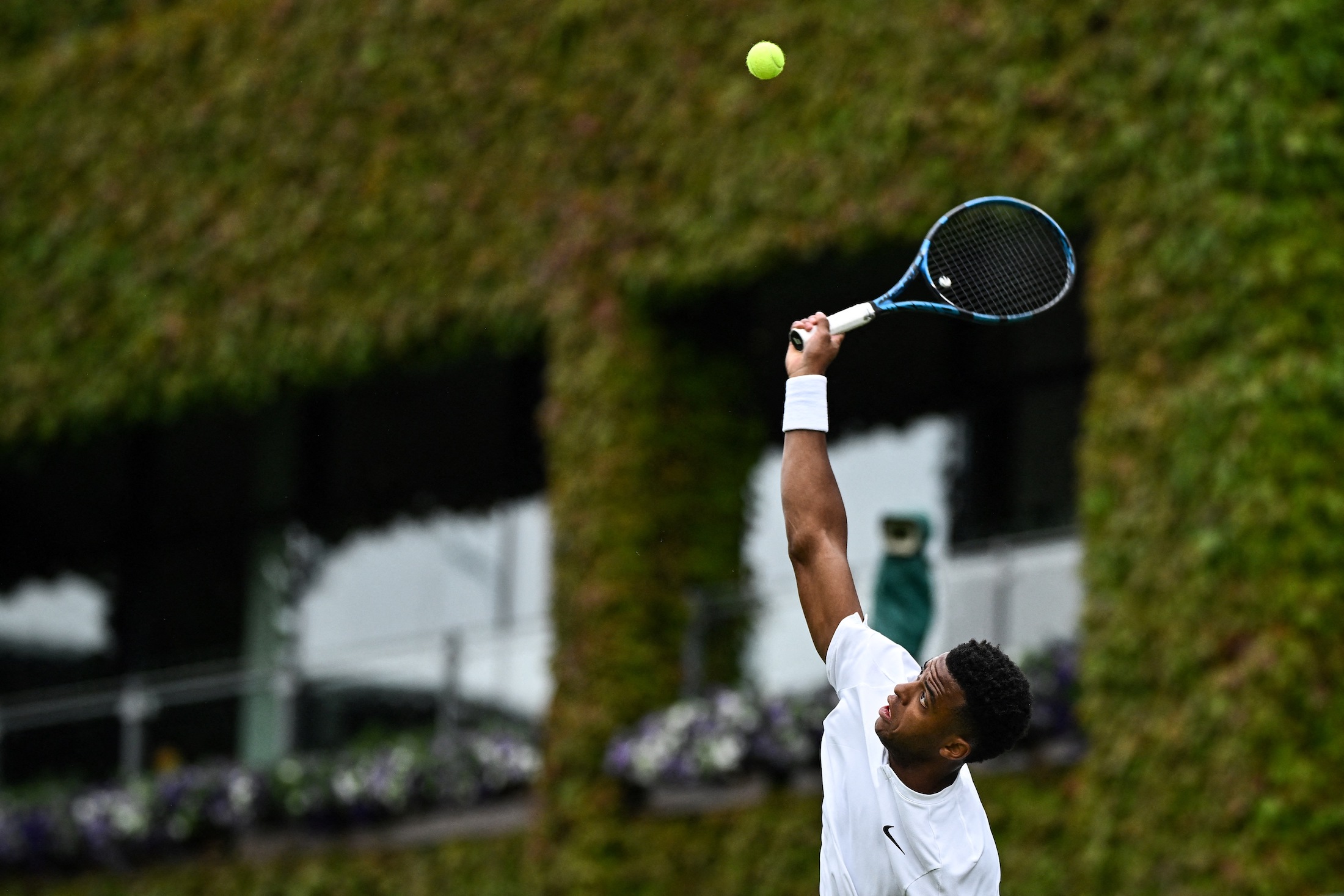LONDON — While catching some shade near the Wimbledon practice courts a few days before the tournament started, I watched Sebastian Korda take what looked to me like perfect serves. Korda is a twiggy 6-foot-5, with blonde hair reminiscent of the bird from Peanuts—his birthright, as "Woodstock" used to be his father's nickname on the tour. His tennis gleams with a technical perfection that outstrips even his No. 21 ranking in the world. Everything looks smooth and aligned. His coach Radek Stepanek was trying to get him to exaggerate the pronation of his wrist, slapping the ball straight down for emphasis, and Korda was steadily dialing up his serves to match speed. Ball cans were placed at the corners of the service box for him to aim at. The world No. 8 Casper Ruud, who happened to walk by, told Korda he'd give him $30 if his serve hit a can. The offer ticked down with each miss. Korda wrecked a can when the payout was still at $15. The coach pressed Ruud for a payment, but he begged off, saying he'd do it in Cincinnati once he had dollars again, and walked away.
Korda kept serving and must have smashed four more cans in the next 15 serves alone. I came away thinking that he was going to have a big tournament on the grass, where the courts are slick and the serve is supreme. What was hard to imagine, at that time, is that Korda would immediately crash into an opponent who could make that serve look utterly pedestrian, the difference between an apple falling from a tree and a meteor flung from the cosmos. That's what happens when you eat 51 aces from Giovanni Mpetshi Perricard in the first round.
I'd seen the name before, but the first time I really reckoned with Giovanni Mpetshi Perricard was courtesy of the pro player and edifying vlogger Karue Sell, who proclaimed a few months ago that this 20-year-old Frenchman, then ranked outside the top 150, was actually a top-10 server in the world. That was my cue to tune in. Not long after, I watched Mpetshi Perricard play in Lyon, which was just his second tournament at the tour level, and was shaken by his odd mix of characteristics: the stature of an NBA power forward, plus a one-handed backhand, plus some sweet hands at the net. Here was the servebot evolved. At 6-foot-8, he clearly had the size to thump his serves, but he was also combining that with non-oafish movement and a respectable ground game that occasionally spiked into brilliance. He won the title at Lyon after beating three top-50 players on clay, the surface that most neutralizes a big serve. It felt inevitable that he would rock his opponents on grass, the surface that maximizes it.
Mpetshi Perricard was the top seed in the qualifying tournament to enter Wimbledon, but lost his last match. He needed some luck—injury withdrawals—to slink into the draw anyway. His fortune was Korda's misfortune. Under a gray layer of permanent cloud, Mpetshi Perricard bombed his way to a tiebreak-studded upset of the No. 20 seed in his first-ever appearance in the main draw at Wimbledon, 7-6(5), 6-7(4), 7-6(6), 6-7(4), 6-3.
It was the most preposterous serving performance I've seen in person. This crowd—which, in my experience, is a little sluggish to come around to underdogs—gawked in slow-building disbelief as they realized that the ball could travel directly from Mpetshi Perricard's racquet to a ball kid's hands, for a minute straight, serve after serve, with Korda unable to stage any intervention with his racquet. Mpetshi Perricard's 51 aces accounted for 27 percent of the total points he won. Also, the definition of an ace is strict, meaning Korda could not have touched the ball at all; there was another sizable chunk of serves that Korda poked at but couldn't coax back into play. Unfortunately they were not displaying or recording serve speeds on this court, but the sonic experience, Perricard's own history, and Korda's helplessness suggest that he was pushing towards 140 mph with regularity. He didn't hold much back on his second serves either, notching seven aces to go with his 10 double faults.
A Mpetshi Perricard service game sounds like a construction site: a series of booming and clattering sounds, followed sometimes by vague grumbling. It's a decisive, unfussy service motion, as he pops a few inches off the ground with his powerful legs to give himself an even higher contact point. I began to play a game—not to guess where he was serving, as I sometimes play with big servers, but to stare at the relevant patch of turf and simply try to perceive the ball's bounce at all.
The match was broken up by two rain delays, and there was no break of serve until the fifth set, hence the festival of tiebreaks. Korda, who had an abdominal injury and received some medical treatment midway, looked miserable throughout the encounter. At the end of the third-set tiebreak, Korda found two set points. Mpetshi Perrciard responded with two unreturned serves and a gorgeous forehand volley winner to steal the set away. At the conclusion of that last point, Korda slipped and thudded flat on his back, then lingered on the ground, as if he might just hang out there for a little while.
Precious opportunities appeared and went to smoke, because Mpetshi Perricard executed every single time he was in a scoreboard bind. He erased all 11 break points he faced in this match. There was a moment at 2-3 in the fourth set where he fell to 0-40 in a service game—a miraculous, one-of-one opening for Korda—only for the big man to spring back with a trio of stylishly won points. He was asked afterwards what he was thinking when he stepped to the line to serve on a break point. "Try to not lose the point," he deadpanned, before explaining how simple his approach is: serve at the T or out wide and then get to net as soon as possible. That might be the biggest psychological edge of a monster serve: It simplifies the flowchart of any given point, stripping away all other worry or complexity. Just wait for one sloppy service game from the opponent and a whole set is sealed. Right after winning the fourth-set tiebreak to extend it to a fifth set, Korda slipped in one such service game and was broken. Storming to his seat while abusing himself in Czech, he knew he was doomed from there.
Sometimes I felt I was not watching a tennis match so much as I was witnessing a colossal, inarguable force of nature. It remains to be seen what the tour's elite returners can do to Mpetshi Perricard—Korda is good but not best in class—but any middling returner is going to find himself on the business end of a lot of 7-6 sets. Perricard can hold up better than servebots past in a baseline exchange, as he outfoxed Korda in a number of neutral rallies, but he can also get rushed and spray the ball off his frame. If he could get about 20 percent more consistent from the baseline, as a matter of movement and timing, he would be unbeatable except by the best players in the world. Some measure of top-20 success seems like a foregone conclusion.
This presents another key question: Is Mpetshi Perricard cool? I liked his calm, understated manner and his improbable if shaky one-hander. I enjoyed his forays to the net, his buttery half-volley pickups and the way he could blanket the net with his wingspan and reflexes. I also wished he was pressed to do those things more often. My provisional ruling is that GMP is in fact cool. But it's a dangerous game, serving this well. A professional gift can be an aesthetic curse. You are at constant risk of falling into the wackest and most entertainment-averse archetype in the sport. If a few more of these guys crop up, it might just be time to eliminate the second serve. This time, I was willing to stand in place for several hours, through several rain delays, to see the Mpetshi Perricard spectacle firsthand, and was rewarded by sporadic patches of back-and-forth, collaborative tennis points. I can't yet speak for next time.






